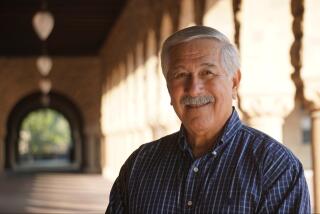Book Review : King Created Own Camelot
- Share via
To Redeem the Soul of America: The Southern Christian Leadership Conference and Martin Luther King Jr. by Adam Fairclough (University of Georgia: $35, hardback; soft-cover, $17.95; 504 pages)
Like his fellow martyr, John F. Kennedy, the Rev. Martin Luther King Jr. has come to symbolize a kind of Camelot in contemporary American history. Under King’s sterling leadership, young men and women of courage and the highest ideals struggled, suffered and ultimately succeeded in dismantling the superstructure of segregation in the Old South.
Yet we are reminded by historian Adam Fairclough in “To Redeem the Soul of America” that the stirring victories of the early ‘60s were the easy ones--morally unassailable, politically comfortable, historically inevitable. By the time of his assassination, King himself had come to realize that the afflictions of America’s poor and underprivileged of all races would not be solved by a sit-in or a civil rights bill.
The ‘Destructive Triplet’
“War, poverty and racism were tied together, he thought, in an inseparable and destructive triplet,” writes Fairclough, a professor at the University of Wales. “With its influence abroad crumbling, its cities convulsed by rioting poor, and its civilization being corrupted by excessive materialism, the United States seemed to be ‘headed the way of the Roman Empire.’ People expected him to have answers, he told his wife, but he had none.”
“To Redeem the Soul of America”--the title echoes the credo of King’s Southern Christian Leadership Conference--is Fairclough’s intimate history of the civil rights movement expressed through the work of King and the SCLC, the church-based activist organization that provided the political context and logistical support for King’s leadership. It is a peculiarly American saga of triumph and tragedy--the emergence of Martin Luther King Jr. as an international symbol of Ghandian “nonviolent direct action,” the early victories over Jim Crow in the courts and legislatures, the ill-fated move into the ghettos of the urban North and the seeming obsolescence of King’s vision in an era of war, riots, assassination and extremism of all shades, white and black, left and right.
Scholarly Prose
The book is sympathetic but not worshipful, a fine example of scholarly prose that draws its strength not from the sheer invention of the author but rather from the inherent drama of its subject. Fairclough is an accomplished writer who succeeds in capturing the fear, the exhilaration, the sense of moral ascendancy that energized the early years of the civil rights movement.
And we see in vivid detail how King and the SCLC placed themselves at the cutting edge of the struggle for the liberation of black Americans--and, in a real sense, all Americans. “Under SCLC’s leadership,” Fairclough writes, “Southern blacks not only out-sang, out-marched and out-prayed their oppressors, but they also out-thought them.”
Within a decade after its creation in the wake of the 1956-57 Montgomery bus boycott, the SCLC was already in the shadow of more militant factions in both the civil rights and the anti-war movements. Still, those who came after King--including his former SCLC colleagues, Jesse Jackson and Andrew Young--succeeded to a heritage of political savvy, unambiguous moral commitment and sheer physical courage.
As Fairclough demonstrates, King and the SCLC sensed the strategic value of white violence (“Police repression often evoked black solidarity: the civil rights movement was to win its most notable victories when it confronted unscrupulous police officials like ‘Bull’ Connor of Birmingham and Jim Clark of Selma”). And yet, under the tutelage of his miscellaneous political mentors, King came to regard himself as a resource not to be squandered: “King and his advisers were also keenly aware that King’s symbolic coin would rapidly become devalued if he went to jail too often or at the wrong time at the wrong place.”
Treacherous Enemies
The Ku Klux Klan was not King’s only enemy and perhaps not his most treacherous one. During the 1960 presidential campaign, an ambivalent John F. Kennedy, fearful of alienating white voters, was livid when it was reported that he had intervened to secure King’s release from an Atlanta jail; Kennedy’s campaign chief in Georgia, the future attorney general Griffin Bell, “tried to reassure white voters that ‘Sen. Kennedy would never interfere in the affairs of a sovereign state.’ ”
Even if the story of King and the SCLC ends on a despairing note, I came away from Fairclough’s wholly absorbing book with the reassuring conviction that King’s moral example will survive: “We are going to walk together,” King told one of the earliest audiences. “Right here in Montgomery, when the history books are written in the future, somebody will have to say that there lived a race of people--a black people--a people who had the moral courage to stand up for their rights and thereby injected new meaning and dignity into the veins of history and civilization.”


